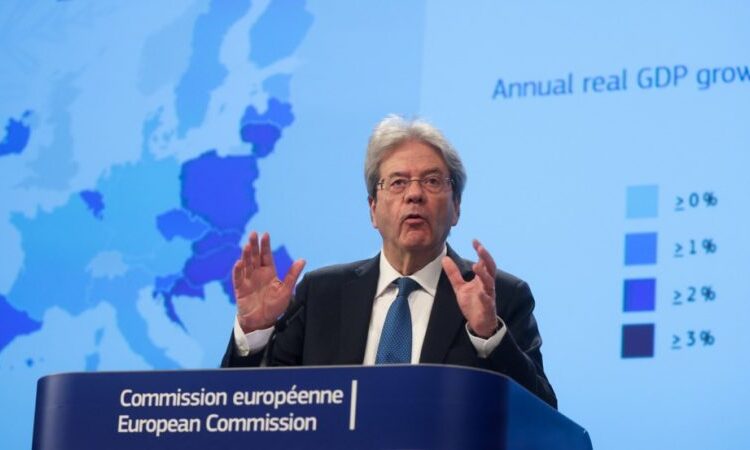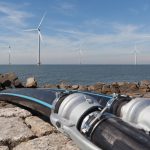Recovery fund should be ‘blueprint’ for permanent joint borrowing, EU Commission economy chief says – Euractiv

The EU’s economic chief Paolo Gentiloni officially called for turning the bloc’s Recovery and Resilience Facility (RRF) into a “permanent” resource on Tuesday (9 April), saying the “temporary nature” of the programme has so far prevented it from unleashing its full potential.
Gentiloni warned at an RRF meeting between the Commission and the Belgian presidency of the Council that an annual additional investment of €650 billion was needed for the bloc’s digital and green transition, adding that “new priorities have come to the fore,” such as increased spending on defence and reconstruction of Ukraine.
The EU Commissioner for the Economy said the RRF will help fill that investment gap until it expires in 2026, “but of course, our investment needs do not end [then]” he added.
“I have no doubt that the EU would benefit hugely from a permanent, safe asset commensurate with the size of its economy, and this will be a big issue to discuss for the next Commission,” said Gentiloni.
“I am equally convinced that our end goal should be the establishment of an EU-wide central fiscal capacity,” he said, adding that this was “crucial to provide European public goods in areas such as energy, innovation and defence.”
Gentiloni’s backing for a permanent EU-funding programme was echoed by Belgian state secretary Thomas Dermine (PS/S&D), who warned that the bloc’s ability to channel funds into green investments is impacted by reformed fiscal rules – known as the Stability and Growth Pact, whose revision was agreed upon in February after some tough negotiations.
Room for flexibility within the new EU fiscal perimeters will be “quite limited,” said Dermine, warning that “in most member states, we won’t have enough budgetary capacity to fund those investments.”
“So the only solution is […] that, basically, the type of instrument that we created together with the RRF will need to be replicated in the coming years,” he added.
Gentiloni and Dermine’s statements on Tuesday mark a shift away from previous EU rhetoric around the need to rely on private financing for the green transition – and to therefore strategically focus on shoring up the integration of capital markets.
In line with negative feedback, given by economic analysts, Dermine said private investment will not be enough.
“Of course, we need to stimulate private capital markets,” he said, “but let’s be clear: If we rely solely on green capitalism to make it work, it will be too little, too late.”
Rebuffing criticism
Gentiloni also countered recent criticism of the RRF’s effectiveness and operational functioning – as concerns were raised over member states’ slow implementation of the structural reforms necessary to unlock the distribution of RRF funds.
The Italian official argued that the €723 billion joint borrowing scheme set out in 2020, played a key role towards the bloc’s economic resilience, greatly contributing to Europe’s recovery from the Covid-induced crisis.
Despite the shock, “the European economy returned to its pre-pandemic output level by the third quarter of 2021, which is much sooner than expected,” he said.
He contrasted the speedy recovery from the pandemic, with the seven years it took for the EU’s economic output to recuperate following the 2009 financial.
“The impulse from the RRF is also supporting economic convergence in the EU,” as it is yielding “its strongest effects in the Southern and Eastern member states,” Gentiloni pointed out.
“I believe the design of the RRF can serve as a useful blueprint for the future.”
However, “the temporary nature of the instrument has prevented […] from reaping the full benefit of this common borrowing, in particular in terms of cost of financing,” Gentiloni warned – referring to analysis by EU policy think-tank Bruegel that recently criticised the EU’s investment programme as “finite and sporadic”.
Stirring up the debate
A renewed EU joint borrowing scheme has been particularly opposed by doubters from the conservative side of the political spectrum, Siegfried Mureşan, Vice Chair of the European Parliament’s centre-right EPP group, argued that “throwing money at problems does not always solve the problem.”
However, Gentiloni highlighted that a permanent EU-level fund had also been recommended by international economic institutions such as the International Monetary Fund (IMF), the OECD and the European Central Bank (ECB), during the revision of common EU rules for national debts and deficits.
“We did not include this in our proposal at the time to avoid making an already challenging – as you have seen – debate even more complicated,” said Gentiloni, about the four-year-long negotiations on the reform of the fiscal rules.
While ‘frugal’ countries like Germany insisted on strict rules to reduce levels of national public debt, critics fear that the new rules will prevent countries from making necessary public investments, particularly those targeted at reducing carbon emissions.
A study published on Sunday by the European Trade Union Confederation (ETUC) and think-tank New Economics Foundation argues that with the spending limits introduced by the reformed fiscal framework, “only three countries (Denmark, Sweden, Ireland) can afford to meet social and green investment needs.”
[Edited by Anna Brunetti/Rajnish Singh]







